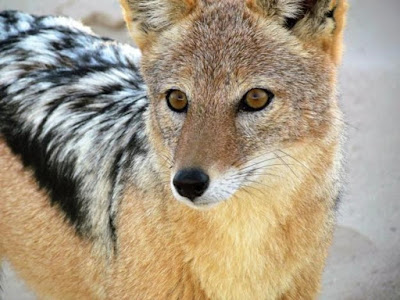Hanuman raced towards the banyan tree, looking for Pirakuan. He concealed himself high in the branches as he saw her approaching. Macchanu said he could trust her, but she was Maiyarap's sister-in-law after all. "That must be her," Hanuman thought to himself, seeing her green eyes brimming over with tears.
"It is karma," she muttered, filling her water-bucket. "I condemned my mother's sons in the river's water, and now I draw water in which Maiyarap will boil my own son, together with that god-like stranger."
At these words, Hanuman jumped down, landing beside the well and bowing his head. "Macchanu sent me, Lady Pirakuan. I am here to rescue the stranger, and I will rescue your son also. Will you help me?" When she did not reply, he lifted his eyes to look directly at her. "My lady, will you help me?"
Pirakuan stared back at him, her mouth open in speechless surprise.
"My lady," Hanuman repeated for the third time, "will you help me?"
"Of course I will help you," she said, shaking her head in wonder. "Forgive my confusion; I will explain later. But now, we must hurry: Maiyarap is holding my son and your friend in a cage inside the palace garden. He put them into a deep sleep while I bring buckets of water to fill the pot. The fire is blazing hot, and the pot is almost full; you have arrived just in time."
"Excellent!" Hanuman exclaimed. "I shall kill him myself, and we can all make our escape together!"
"It is not so easy as that," said Pirakuan. "Maiyarap has concealed his life-force far from here. Before he died, my husband, Maiyarap's brother, told me about it; he feared that someday Maiyarap might try to kill our son. See that hill in the far distance? On top of that hill, there is a tree, and in that tree, there is a birdcage, and in that birdcage there is a parrot who has swallowed Maiyarap's life-force to keep it safe. As long as that parrot is alive, Maiyarap is invincible. We'll never be able to get the parrot in time."
Hanuman laughed. "Have no fear, my lady!" Then he grew to an enormous size, stretching miles high into the sky. The gigantic monkey reached his arm towards the hill, and just as quickly as he had grown in size, he shrank back down to earth, but now he held the birdcage in his hand. As Pirakuan stared in amazement, he opened the birdcage and grabbed the parrot.
"You take this," he said, "and now, let's find Maiyarap." He then turned into a frog and leaped with a splash into the water-bucket.
Pirakuan stuffed the parrot inside her inner shirt, grabbed the bucket, and hurried as fast as she could to where Maiyarap awaited her in the garden; the guards noticed nothing out of the ordinary as they let her through the palace gate.
"Wretched woman!" shouted Maiyarap. "What took you so long? It's time to boil that worthless son of yours along with this puny human. At last, we can begin!"
"Brother-in-law, I…"
But before she could speak another word, Hanuman leaped out of the water-bucket, once again in his monkey form.
"A monkey!" Maiyarap exclaimed. "Ravana told me the human had an army of monkeys, but I thought he was joking."
"Laugh all you like, Maiyarap," Hanuman replied. "But I am here to kill you. Or, more precisely: to kill your parrot!" He then turned to Pirakuan and commanded, "Show him the parrot."
Without taking her gaze from Maiyarap, Pirakuan reached into her garment and pulled out the parrot, clutching it tightly as she waved it slowly back and forth.
Maiyarap stared in horror. "Damn you, you traitorous whore!" he shouted. "Damn you and my lovestruck brother, damn…"
Interrupting him Hanuman shouted, "Throw it into the fire!"
Pirakuan hurled the parrot into the flames, and as the bird burned, Maiyarap's skin crackled and blackened, flames flickering forth from his mouth as he tried to speak.
And then, Maiyarap was dead.
"Hurry!" Pirakuan shouted. "We have to get my son and your friend out of the cage and wake them somehow. Can you do that, good monkey?"
"Why of course!" said Hanuman happily. He pulled the iron cage open and grabbed Rama and Wayawik, both fast asleep. "I will carry these two while you ride on my back."
So Pirakuan jumped on Hanuman's back and he flew up out of the garden, back to the pond at the entrance to the underworld. Macchanu ran to assist Pirakuan as she climbed down, while Hanuman laid the sleeping Rama and Wayawik on the ground, softly chanting a mantra to awaken them.
"Hanuman!" said Rama sleepily. "Is it already morning?"
Hanuman laughed. "It is, my lord! And with the help of this good lady, I have killed Maiyarap, and this is his nephew, her son, beside you. And this —" Hanuman grabbed Macchanu and pushed him towards Rama. "This is my son, Macchanu."
"And I, Lord Hanuman, am your mother, Swaha," said Pirakuan softly.
Hanuman whirled around to face her, dumbfounded.
"I told you I would explain later," she said smiling at him, "and this is my story. After leaving you with Shiva on Mount Kailash, I descended into the world again, choosing a new name for my new life. I fell in love with Aiyarap, Maiyarap's brother. When he died, I found myself with my young son trapped here in Maiyarap's world. I never dreamed you would be the one to save us."
Amazed, Hanuman embraced her. No longer alone, he now had a son, and a mother, and a new-found brother too.
Rama appointed Macchanu and Waiyawik as co-kings of Maiyarap's kingdom, and then he returned with Hanuman to the camp. They had a war to fight against Ravana after all.
"I will come back, Mother," said Hanuman to his mother in parting.
"I know you will, my son," she said. "I know."
Author's Note. I have to say right away that the idea that Pirakuran is Hanuman's mother is totally my idea! I had written about Hanuman's birth in an earlier story, and I had wondered all semester long if I could bring back Swaha somehow, and then I had this sudden flash of inspiration, realizing that she could be Pirakuan. The reference to Pirakuan condemning her brothers in the water is a reference to that earlier story. In the traditional version, Pirakuan is Maiyarap's sister, not his sister-in-law, so that was the only little change I had to make. I made up the name Aiyarap based on the Indian tradition that makes Mahiravana the twin brother of Ahiravana.
Another change I made was the parrot: in the original, Maiyarap has concealed his life-force in a bumblebee which Hanuman is able to grab much like I described in my story; I wanted to use a parrot because I thought it would be more fun to have Pirakuan hold it her hand to taunt Maiyarap. I was inspired to choose a parrot because of the Indian folktale Punchkin, where the parrot is the evil magician's life-force animal. The set-up is more elaborate in that story:
Far, far away, hundreds of thousands of miles from this, there lies a desolate country covered with thick jungle. In the midst of the jungle grows a circle of palm trees, and in the centre of the circle stand six chattees full of water, piled one above another: below the sixth chattee is a small cage which contains a little green parrot; on the life of the parrot depends my life; and if the parrot is killed I must die. It is, however, impossible that the parrot should sustain any injury, both on account of the inaccessibility of the country, and because, by my appointment, many thousand genii surround the palm-trees, and kill all who approach the place.In the Thai version of the Ramayana, Ravana also has his life-force secretly concealed, and just as Hanuman was able to obtain the life-force to kill Maiyarap, it was also Hanuman who obtained Ravana's life-force, enabling Rama to kill him in the end.
Bibliography: My main source for this story is The Ramakien: A prose translation of the Thai Ramayana by Ray Olsson (published in Bangkok in 1968). Online at Chulalongkorn University Library.
Image Information:
banyan tree
Hanuman and Butsamalee (I could not find one of Hanuman and Pirakuan)
parrot
Maiyarap (this is actually an image of him preparing the magic powder)
Hanuman
Hanuman carries sleeping Rama
Hanuman mural
Although I did not include this part of the story, here is an image showing Pirakuan being weighed on the scales; Hanuman has concealed himself as a lotus thread woven into her garment (I had him sneak in as a frog in the bucket):



































